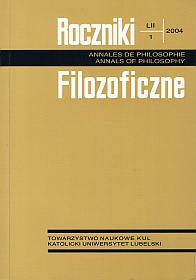Psychologism versus Anti-psychologism: John Locke’s Characterisation of Mental Contents
Abstract
The paper seeks to give an ontological account of idea as mental content in the philosophy of John Locke. The foundation on which to place and polarise philosophical standpoints with regard to this issue is the 17th-century controversy between J. Locke and N. Malebranche with respect to the genesis of human knowledge. Showing the foundation of this controversy, as expressed in the polemic work of Locke entitled An Examination of P. Malebranche’s Opinion of Seeing All Things in God, I shall outline two possible approaches to our mental contents, namely the psychologistic and anti-psychologistic ones. In this perspective Locke is a representative of the first standpoint, whereas Malebranche of the second. In the psychologistic approach, the content of our conscious acts (or according to 17th-century Cartesian philosophy ideas) is exclusively an internal element of this consciousness. On the contrary – in the case of the anti-psychologistic characteristation, the content of our consciousness is described as ontologically antonomous, i.e. as independent from thr knowing subject. Following the analyses of An Examination, I obtain additional arguments on behalf of the psychologistic interpretation of Locke’s conception of idea (expressed, among others, by J. Yolton and M. Ayers), contrary to the anti-psychologistic approaches (claimed by, among others, T. Reid, R. McRae, and N. Jolley).
References
Arnauld A. 1683/1967: Œuvres de Messire Antoine Arnauld, Docteur de la Maison et Société de Sorbonne, vol. XXXVIII, Brussels: Culture et Civilisation.
Ayers M. 1991/1993: Locke, vol. I-II, London–New York: Routledge.
Ayers M. 1998: Ideas and objective being, [w:] The Cambridge History of Seventeenth-Century Philosophy, ed. by D. Garber, M. Ayers, vol. II, Cambridge: Cambridge University Press 1998, s. 1062-1107.
Chappell V. 1994/1997: Locke’s theory of ideas, [w:] The Cambridge Companion to Locke, ed. by V. Chappell, Cambridge: Cambridge University Press 1997, s. 26-55.
Czerkawski J. 1990-1992: Byt i nieskończoność w filozofii N. Malebranche’a: Dowód na istnienie Boga z prostego oglądu, „Roczniki Filozoficzne”, 39-40, z. 1, s. 255-270.
Descartes R. 1641/1958: Medytacje o pierwszej filozofii wraz z Zarzutami uczonych mężów i odpowiedziami autora oraz Rozmowa z Burmanem, t. I-II, tłum. M. i K. Ajdukiewiczowie, S. Swieżawski, I. Dąmbska, Warszawa: PWN.
Johnston Ch. 1958: Locke’s Examination of Malebranche and John Norris, „Journal of the History of Ideas”, 19, s. 551-558.
Jolley N. 1990: The Light of the Soul: Theories of Ideas in Leibniz, Malebranche, and Descartes, Oxford: Oxford University Press.
Locke J. 1690/1955: Rozważania dotyczące rozumu ludzkiego, tłum. B. J. Gawecki, t. I-II, Warszawa: PWN.
Locke J. 1690/1975: An Essay Concerning Human Understanding, ed. by P. H. Nidditch, Oxford: Oxford University Press.
Locke J. 1706/1862a: An Examination of P. Malebranche’s Opinion of Seeing All Things in God, [w:] J. Locke, Philosophical Works, ed. by J. A. St. John, vol. II, London: H. G. Bohn 1862, s. 413-458.
Locke J. 1706/1862b: Remarks upon Some of Mr. Norris’s Book, wherein He Asserts P. Malebranche’s Opinion of Our Seeing All Things in God, [w:] J. Locke, Philosophical Works, ed. by J. A. St. John, vol. II, London: H. G. Bohn 1862, s. 458-471.
Locke J. 1823: The Works of John Locke, vol. X, London: T. Tegg.
Locke J. 1971: Locke’s First Replay to John Norris, ed. by R. Acworth, „Locke Newsletter”, 2, s. 7-11.
Malebranche N. 1674-1678/1958-1970: Œuvres complètes de Malebranche, dir. A. Robinet, t. I, III, VI, Paris: J. Vrin.
Mathews H. E. 1977: Locke, Malebranche and the Representantive Theory, [w:] Locke on Human Understanding, ed. by I. C Tipton, Oxford: Oxford University Press, s. 55-61.
McCracken C. J. 1983: Malebranche and British Philosophy, Oxford: Oxford University Press.
McRae R. 1965: “Idea” as a Philosophical term in the Seventeenth Century, „Journal of the History of Ideas”, 26, s. 54-77.
Pucelle J. 1978: Introduction, [w:] J. Locke, Examen de la «Vision en Dieu» de Malebranche, trad. J. Pucelle, Paris: J. Vrin, s. 7-28.
Reid T. 1786/1983: Philosophical Works, ed. by W. Hamilton, vol. I-II, Hildesheim–Zürich–New York: Olms.
Twardowski K. 1892/1976: Idea i percepcja: Z badań epistemologicznych nad Kartezjuszem, tłum. E. Paczkowska, „Archiwum Historii Filozofii i Myśli Społecznej”, 22, s. 317-344.
Yolton J. W. 1977: The Locke Reader: Selections from the works of John Locke with a general introduction and commentary, Cambridge: Cambridge University Press.
Yolton J. W. 1981: Locke and Malebranche: Two Concepts of Ideas, [w:] John Locke: Symposium Wolfenbüttel 1979, ed. by R. Brandt, Berlin–New York: W. de Gruyter 1981, s. 208-224.
Yolton J. W. 1990: Mirrors and Veils, Thoughts and Things: The Epistemological Problematic, [w:] Reading Rorty: Critical Responses to Philosophy and the Mirror of Nature, ed. by A. R. Malachowski, Oxford: Blackwell 1990, s. 58-73.
Yolton J. W. 1993: A Locke Dictionary, Oxford: Blackwell.
Copyright (c) 2004 Roczniki Filozoficzne

This work is licensed under a Creative Commons Attribution-NonCommercial-NoDerivatives 4.0 International License.





